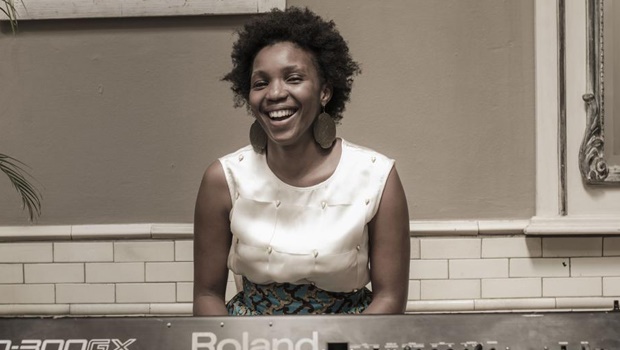
After being well received at last year’s Standard Bank National Jazz Festival in Grahamstown, composer, artist and pianist Thandi Ntuli will return to the stage during April’s Cape Town International Jazz Festival. Over coffee, she chatted to Lloyd Gedye about her career, which is on the up and up, her album, her band, her brand of jazz, and patriarchy in the industry
"I want to talk about South African jazz and the patriarchy,” I tell Thandi Ntuli, sitting across from her in a coffee shop in Norwood, Johannesburg, last week.
Ntuli smiles and then laughs.
“Sips tea,” she says as she raises her cup to her lips.
But it’s just a pretence at avoiding the subject.
“I do think that women are being seen more as instrumentalists and bandleaders now,” she says. “They are not just being seen as singers.”
On April 2, Ntuli will take to the stage at the Cape Town International Jazz Festival as a bandleader, performing her own compositions from her gorgeous album, The Offering, which was released in 2014.
“There is definitely still a lot of [sexism],” she says. “‘You play so well for a girl,’ or ‘You should meet Thandi, she is the best female pianist in the country.’ I mean really, did they have to go there?”
We chat about Siya Makuzeni being recognised as the Standard Bank Young Jazz Artist for 2016, although that recognition is “long overdue”.
We also discuss the fact that in South African jazz, there are still only a handful of progressive bandleaders who give opportunities to women.
Bandleaders such as Feya Faku, Carlo Mombelli and Marcus Wyatt, and the younger generation represented by Nduduzo Makhathini and Tumi Mogorosi, are the exceptions rather than the rule.
Ntuli moved to Johannesburg in 2013, a few years after she finished her four years of studying jazz piano at the University of Cape Town.
In 2008, she was offered a scholarship to study at the Berklee College of Music in Boston in the US, but chose to stay in South Africa and complete her studies.
She says Berklee is a massive school and she felt she might find that she was not getting as much attention as she needed.
Ultimately, Ntuli does not regret her decision, as she thinks it is all about the “environment that you are cultivated in”.
In 2013, Thandiswa Mazwai announced that she was forming an all-female band. Ntuli auditioned and was selected.
“That’s what brought me up to Joburg,” she says. “I haven’t looked back.”
She played with Mazwai between 2013 and 2015, during which she learnt a lot and grew into her career, but she was also making her own moves at the same time.
Ntuli wanted to get into the studio and record her own compositions.
She had a band of musicians lined up, which included guitarist Keenan Ahrends, bassist Benjamin Jephta, drummer Sphelelo Mazibuko, vocalist Spha Mdlalose, trumpeter Marcus Wyatt and saxophonists Sisonke Xonti and Mthunzi Mvubu.
“Benjamin and I met at university,” says Ntuli. “When I first started playing live, it was with a trio, with Benjamin on bass and a drummer called Ruben.
“We had a musical chemistry,” she says. “He always brought a lot to the table and is a fantastic bass player.”
Another varsity friend is Xonti, a saxophonist Ntuli has played with often.
Speaking about drummer Mazibuko, Ntuli says: “I saw him at a gig. I thought he was a fantastic drummer, but he didn’t live in Johannesburg. When he moved to Johannesburg, I was like, ‘Hallelujah!’”
“With Marcus Wyatt, I played in his youth band in 2013 at Grahamstown. I revered him, but then I met him and realised he was chilled and interested in working with younger musicians.
“Mthunzi Mvubu has a distinct sound and he is always trying to grow and get better.”
With the band lined up, she hit the studio.
“I went into the studio without the money,” says Ntuli. “I had agreed with everyone what they were getting paid and that they were happy to be paid later.
“I applied for a lot of funding, but I didn’t get any of it. Time was passing and I didn’t have the money,” she says.
In August 2014, with Ntuli facing the challenges of being an independent artist, she convinced The Orbit – Joburg’s premier jazz club – to let her have the venue for free and she organised a gig, from which the proceeds went to pay her recording artists.
The resultant album, The Offering, was released in September 2014 and has received praise from critics and fans alike.
Ntuli’s show as bandleader at the Grahamstown National Arts Festival last year was one of the programme’s highlights, as was Makuzeni’s show, in which Ntuli featured.
Speaking about the success of her debut album, Ntuli says she wanted to remain in control of her career and not sign to a label.
“There are lots of artists where I listen to their first, second, third album and then I lose interest in them,” she says. “I think, and I’m not sure, that there is a lot of pressure placed on them to produce things, to churn things out.
“I didn’t want to put that kind of pressure on myself. Some years, I may write 20 songs, sometimes it might take five years to write 20 songs.
“I feel lucky about the way things turned out, but I feel when you work hard, you get lucky,” she says.
“The fact that we live with the internet made it easier to release my album independently.”
Critics have compared her spiralling piano compositions to those of Bheki Mseleku. Ntuli readily admits that the work of Moses Molelekwa, Andile Yenana and Afrika Mkhize also inspired her.
However, she draws influence from all over Africa, which is why she likes Molelekwa’s music so much – he incorporates other African musical ideas in his work.
“I think there is a lot of influence on my album from outside of South Africa,” she says.
Ntuli feels an affinity with music from Mali and is particularly in love with the work of Oumou Sangaré. There is even a song on The Offering titled Sangaré, a tribute to the great singer.
“It’s all about the rhythm,” she explains.
She says her older sister opened her ears to music from the continent.
Ntuli’s journey with music, however, began at a young age and is down to her mother’s influence.
“I don’t know if it’s my first musical memory, but one of the early ones was when I was young and playing piano in competitions. I was always afraid to go on stage,” she says. “I started playing piano at the age of four, but these memories are from when I was six or seven.”
She used to hold on to her mother’s dress tightly, she says. “I can’t remember what she used to say, but somehow she would coax me to go on stage.
“My mom loves the piano, so she tried to get all three of my older siblings to play, but she started quite late with them.
“I was the last born and someone told her you have to start young – so she decided that this one ... this one is going to do it.
“I hated most of it, but I eventually started enjoying it,” she says. “It was a chore. My mom used to threaten me – that if I didn’t practise she would stop sending me to lessons. And then I would practise, so I guess I loved it the whole time. I just didn’t like the chore.
“In high school, I was starting to lose track when practising; I would end up on a tangent, trying to make up my own songs,” she says. “So I realised that I had an interest in writing music and that I could make a career out of it.”
When I ask her how she got into jazz, she laughs.
“Jazz was a mistake,” she says. “I had a gap year after school and I went to the UK, where I met a self-taught pianist and I couldn’t understand how he was playing such beautiful music when he couldn’t read music.
“He told me that he was improvising and, if I wanted to learn how to do that, jazz was a great place to learn,” she says. “So I thought: I am studying that. Improvisation made it seem possible to compose.”
Coming back to the present, Ntuli feels that it is a “really exciting time” for jazz in Johannesburg.
“A lot of it has to do with having a live jazz venue in Johannesburg in the form of The Orbit,” she says.
“Before The Orbit, there was only Nicki’s Oasis and the Afrikan Freedom Station.”
The Afrikan Freedom Station has played an important role in nurturing a generation of young bandleaders and composers who can now step on to a new stage at The Orbit.
Ntuli is quick to acknowledge this.
“The thing with the Freedom Station is it allows you to be as crazy as you want,” she says. “There are certain spaces that allow the artist to be completely themselves.”
The album artwork for The Offering is by artist Mzwandile Buthelezi.
He has also contributed artwork to albums by Benjamin Jephta and The Amandla Freedom Ensemble (an institution at the African Freedom Station), as well as for the recent Born to be Black event at The Orbit, featuring Andile Yenana and Louis Moholo.
“I actually approached Bra Steve Kwena from African Freedom Station to do my album art and he said, ‘I know exactly the guy,’” recalls Ntuli. “So he put me in touch, and Mzwandile said he had always wanted to do album art.
“He said he learnt to draw while looking at his dad’s jazz records. In some way, I think it was destined for him.”
I ask her about the importance of his work in creating a singular visual identity around a new young generation of jazz composers and bandleaders.
“It was an organic thing,” she says. “They say when people are thinking the same things, they get drawn to each other.”
Ntuli finds herself at the centre of a fascinating time of reinvention and rediscovery in South African jazz, drawing inspiration from the talented young musicians surrounding her.
We watch her with bated breath, for her star is rising, and it is rising fast.
Catch Ntuli at the Cape Town International Jazz Festival on the Moses Molelekwa Stage on Saturday April 2 at 9.15pm




 Publications
Publications
 Partners
Partners








